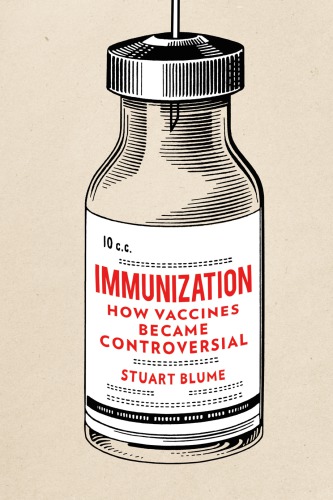
Immunization
How Vaccines became Controversial
- اطلاعات
- نقد و بررسی
- دیدگاه کاربران
نقد و بررسی

October 1, 2017
From vaccine hesitancy to virulent anti-vaccine views, parents are questioning what used to be considered a triumph of public health--vaccines. As so often happens with debates on controversial issues, emotion often trumps information. These two new books offer refreshingly fact-based alternatives to the vitriol dominating the current conversation on vaccines.Feemster (pediatric infectious disease & health policy, Children's Hospital of Philadelphia) offers a concise yet comprehensive introduction to vaccines: how they work; are developed, financed, and distributed; how laws and policies related to vaccines are established; how vaccines are tested and monitored for safety; and why some parents hesitate to vaccinate. This book reads like an extended FAQ, with a few paragraphs of explanation under headers such as "What are active surveillance networks?" While clearly provaccination, Feemster informs without pontificating.Blume's (emeritus, science & technology studies, Univ. of Amsterdam) work is more opinionated, but his thesis does not fit neatly into the pro- or anti-vax camps. Though the title references the vaccine controversy, the author addresses that topic directly only in the last chapter. The remainder of the book introduces vaccines and vaccine technology, then recounts a detailed political and social history of vaccines, focusing primarily on Europe and the United States. From Cold War politics to neoliberal economics, Blume puts policy and advancement into a broader context in which public health sometimes takes a back seat to other, less noble concerns. His central argument, articulated in the final chapter, is that vaccine hesitancy is rooted in mistrust of the institutions that promote them--especially governments and pharmaceutical companies. Both books are for an educated lay audience and include extensive citations. VERDICT While the prose can be dry, readers who wish to be informed of the current debate and issues surrounding it will appreciate the clear, fact-based approaches of both authors.--Janet Crum, Northern Arizona Univ. Lib., Flagstaff
Copyright 2017 Library Journal, LLC Used with permission.

Starred review from September 4, 2017
Blume (The Artificial Ear), emeritus professor of science and technology studies at the University of Amsterdam, grapples with the hot-button topic of immunization programs and public resistance to them in this persuasive, challenging chronicle of how vaccines improved human health—and the pharmaceutical industry’s bottom line—while failing to address doubts about mass inoculation. He ticks off the triumphs of inoculation, from Edward Jenner’s 1796 discovery of the cowpox vaccine to the 1980 declaration of the global eradication of smallpox to shots that now control numerous infectious diseases. But Blume also registers the doubts that have followed vaccination, including modern “vaccine hesitancy.” Blume argues that “declining confidence” in vaccination programs is a public-health problem, but one that won’t be solved with the “concepts of public health.” The mistrust “now infects public and political life more generally.” In poor regions parents feel the “mismatch” between well-funded vaccination programs and a failure “to meet their most basic healthcare needs.” Meanwhile, in wealthy nations alarmism has grown regarding the measles-mumps-rubella vaccine combination and the side effects of pertussis vaccination. Blume’s crucial history illustrates that vaccines have saved countless lives, but they must win the confidence of those who don’t recognize their universal benefit.




دیدگاه کاربران